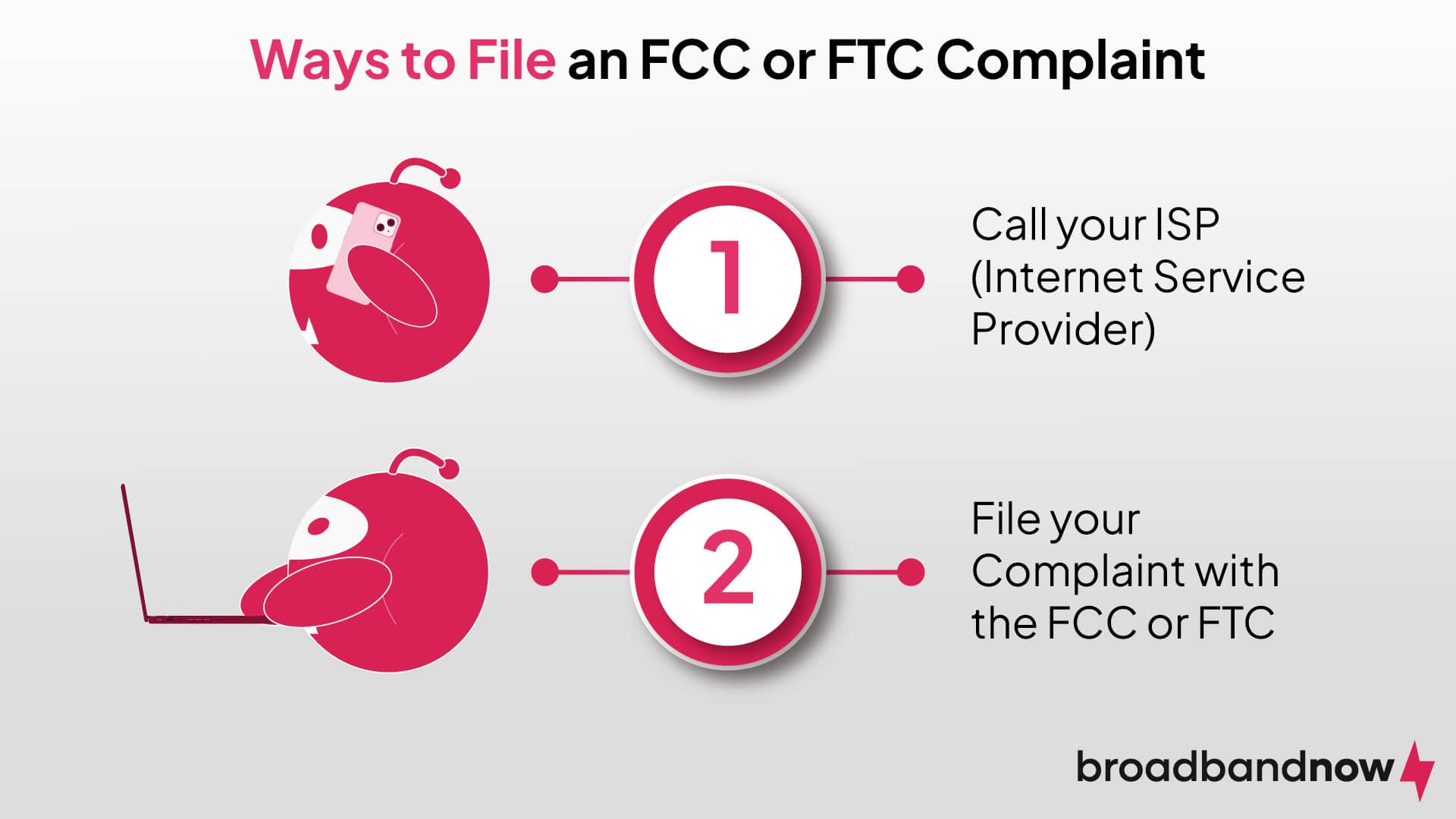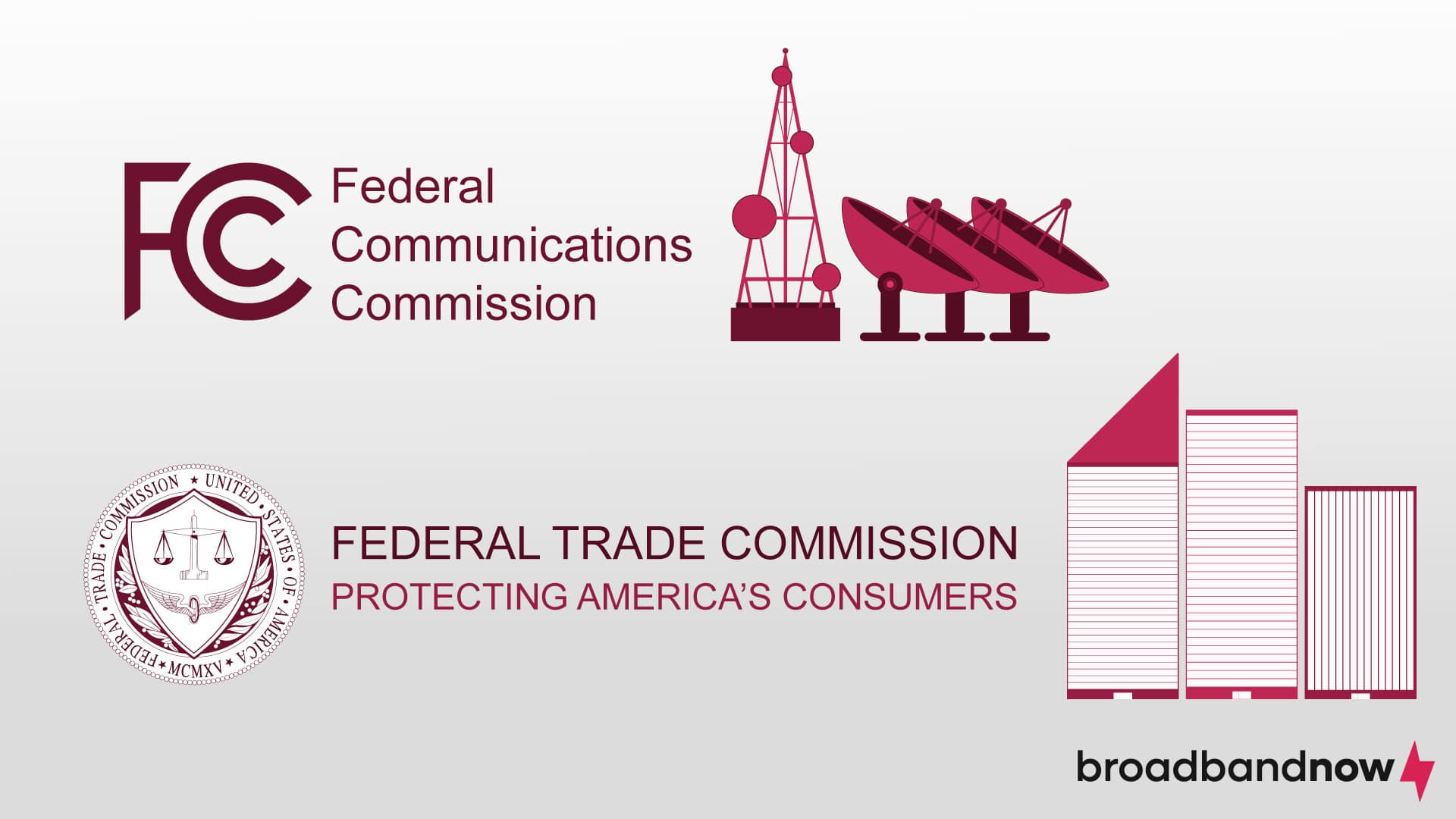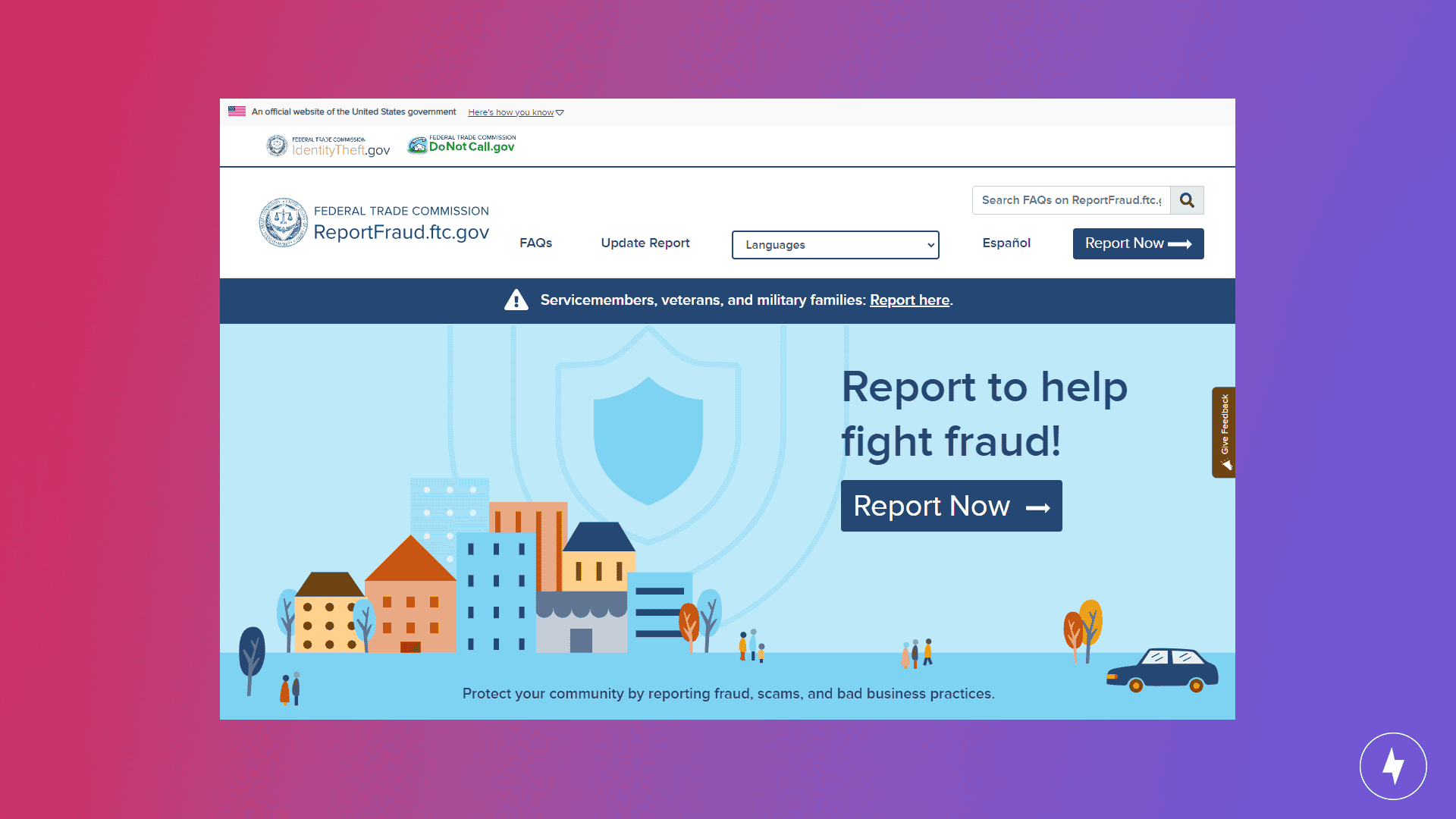How to File an FCC Internet Complaint Against Your ISP
If you’ve contacted your ISP, and you still cannot get a resolution, you may need to file a complaint against your internet provider.

- Before filing a complaint with the Federal Communications Commission (FCC) or Federal Trade Commission (FTC), it’s important to exhaust efforts to resolve issues directly with your ISP, as both agencies expect consumers to approach their providers first.
- While the FCC and FTC share similar consumer protection goals, the FCC focuses on regulating the telecommunications industry specifically; the FTC has a broader scope across various industries, including preventing anticompetitive practices.
- Adequate documentation, including emails, letters, and records of conversations, strengthens FCC complaints against ISPs, increasing the likelihood of a favorable resolution.
In an ideal world, your relationship with your ISP and your quality of internet service would be excellent. If that’s not the case, filing an FCC internet complaint can resolve issues with your ISP. When companies violate the terms of your agreement, the FCC and FTC offer consumers a way to register complaints and ensure these corporations treat them fairly. If you’re facing unresolved issues with your ISP, you may need to file an FCC complaint to spread awareness of these violations and seek solutions.
Overview Of Filing an FCC or FTC Complaint
- What to Do Before You File a Complaint
- What Is the Difference Between the FCC and FTC?
- How to File an FCC Internet Complaint
- How to File an FTC Internet Complaint
- How to Resolve Disputes With Your ISP
What to Do Before You File a Complaint
Before you file a complaint with the FCC or FTC, try to resolve the situation directly with your internet provider. Both the FCC and FTC expect you to approach your ISP first and try to resolve any disputes. Taking the time to call your ISP is the first step and will prove to the organization that you’ve exhausted your efforts before filing your complaint.
Unfortunately, it isn’t always possible to work things out with your internet provider. If you’ve tried to work out the issue with your ISP and still feel that you’re being treated unfairly, the next step is to escalate your complaint to the FCC or FTC.
What Is the Difference Between the FCC and FTC?

The FTC and FCC are two separate organizations that share similar goals.
- FTC: The FTC primarily concerns itself with preventing anticompetitive practices from businesses that would use their power to take advantage of consumers.
- FCC: The FCC has similar goals to the FTC but concentrates its efforts on policing the telecommunications industry.
To put it simply, the FCC regulates the telecommunications industry while the FTC takes a broader approach. The FTC regulates businesses across a wide range of industries.
While it is possible to file complaints for telecommunications issues with both the FTC and FCC, we recommend focusing your efforts first on the FCC. Because the telecom industry is still largely within the FCC’s domain, your complaint is more likely to yield better results.
Here’s a quick guide to what each department can handle.
| Agency | Jurisdiction | Complaint examples |
|---|---|---|
| FCC | Regulates communications by radio, TV, wire, satellite and cable. Focuses on technical and service-related issues with telecom providers. |
|
| FTC | Protects consumers from unfair, deceptive or fraudulent business practices. Focuses on advertising, privacy, and scams. |
|
How to File an FCC Internet Complaint

When filing an FCC complaint, make sure to include your name, address, and contact information. You’ll also need to include as much detail as possible about your complaint, especially if you decide to send a letter.
There are three methods of communicating with the FCC:
- Online portal: FCC Consumer Inquiries and Complaints Center
- Phone: 1-888-CALL-FCC (1-888-225-5322)
- Mail:
Federal Communications Commission
Consumer and Governmental Affairs Bureau
Consumer Inquiries and Complaints Division
45 L Street NE
Washington, DC 20554
For a more streamlined process, we recommend submitting your complaint through the online portal. Here are the steps you’ll follow to complete your FCC internet complaint online:
- Navigate to the FCC Online Complaint portal.
- Under the File a Complaint section, select the issue. In this case, that would be Internet Service Issues.
- You’ll be directed to a Description page, and from there, you’ll click the button to Start your Complaint with the FCC.
- Fill out the form with as much detail as possible and click Submit.
Once your complaint is submitted, your ISP has 30 days to respond directly to you while cc’ing the FCC. It’s in your best interest to follow up if you haven’t heard from the FCC or ISP.
While there’s no formal process by which the FCC will drop your complaint at this step of the appeal, many consumers have reported that their case was closed when they didn’t stay on top of the appeal process.
When you receive the ISP’s response, you can choose either to accept it or respond directly with a rebuttal. The ISP is then required to respond to your rebuttal. Once the FCC is satisfied with the response that you’ve received from the ISP, it will close your case.
Once you’ve determined that the FCC can handle your broadband internet complaint, it’s time to start filing what’s called an informal complaint. Informal complaints make up the vast majority of FCC appeals and are the most realistic avenue of receiving assistance with your ISP dispute. While there is technically a formal complaint process as well, it’s an incredibly complicated legal process that’s generally not worth the effort.
How to Argue Your FCC Complaint
While the FCC generally has an expedient resolution as a priority, it’s always helpful to have taken a few steps to ensure that you receive as favorable an outcome as possible. The primary way that you’ll be able to plead your case against your ISP is by having adequate documentation. If your assertions don’t have evidence to back them up, the FCC may not be able to pressure your ISP to resolve the situation in your favor.
Save a copy of all emails and letters, and consider recording phone calls if that practice is legal within your state. If you can’t record your conversations, at least make a note of who you spoke to and the time and date to reference your communication as easily as possible.
Approaching the situation as professionally as possible will also go a long way. It’s understandable to be upset if you feel that your ISP has wronged you, but approaching everything with a cool head may make both the ISP and FCC more amenable to your complaints.
Last but not least, make sure you’re expediting the process as best as you can. Follow up with the FCC, and if you receive a response from your service provider, ensure that you make your rebuttal as quickly as possible. Letting things drag on can make it more difficult to resolve your case and also force you to wait longer to get your issue addressed.
What Problems Are Out of the FCC’s Jurisdiction?
The FCC does not assist with the issues of false advertising, deceptive business practices, scams, and debt collection. For these issues, you’ll want to contact the FTC.
Additionally, several services are best dealt with at the state level using public utility commissions:
- Burial of telephone or cable wires
- Lack of a dial tone for local phone service
- Stand-alone satellite TV billing, rates, and programming
- Installation of a non-bundled service
- Stand-alone cable TV service
- Utilities outside of telecommunications
If your issue falls into one of the categories above, visit the National Association Of Regulatory Utility Commissioners to find the appropriate state Public Utilities Commission. Alternatively, you can receive assistance by phone at (202) 898-2200.
How to File an FTC Internet Complaint

The FTC is available through an online portal or telephone line and both methods will guide you through the process of the information they need to move forward with your complaint. Either way, before you go into it, ensure you have all the information gathered to file your complaint.
There are two methods for filing a complaint with the FTC:
- FTC Complaint Portal
- 1-877-382-4357
Similar to the FCC, we strongly recommend using the FTC’s online portal. Using the helpline and coordinating through written correspondence is certainly a viable option, but the online portal guides you through the process of making a complaint step by step.
Follow the steps below to complete your FTC internet complaint via the online portal:
- Navigate to the FTC Report Fraud portal.
- Click the Report Now button.
- Choose from the selection of Common Problems that closely match your complaint.
- Choose the type of problem, and click Continue.
- Fill out the form and be as detailed as possible, then click Continue.
- Fill out all of your details and click Submit.
How to Resolve Disputes With Your ISP
The main recourse for those who feel that their ISP is treating them unfairly or illegally is complaints to the FCC and FTC. If your issue is still not resolved after going through this process, you have few options other than switching to another provider, if that’s even an option for you.
However, internet regulation has become a highly politicized issue. Reaching out to politicians who support consumer-centric policy can help reverse some of the freedom that these internet companies have to take advantage of their customers. Consider reaching out to your congressperson. If you’re looking for the correct contact information, utilize a site like GovTrack for assistance reaching out to your senators and representatives.
Frequently Asked Questions About FCC Complaints
How did the repeal of Net Neutrality affect the FCC Complaint process?
Despite its widely acknowledged value in protecting consumers, federal net neutrality rules reinstated by the FCC in 2024 were struck down by the Sixth Circuit in January 2025, shifting primary oversight back to the FTC’s case-by-case enforcement while leaving state net neutrality laws in place. Under the current administration, FCC leadership has begun unwinding the defunct 2024 order and coordinating with the FTC on consumer protection, while the FTC focuses on unfair or deceptive ISP practices pending any congressional action to establish nationwide standards.
Is it legal for my ISP to charge an early termination fee (ETF)?
In many cases, ISPs will offer discounted service provided you sign a contract. By ducking out of your contract early, the ISP may lose out on income that it’s entitled to per the terms of your obligation. ETFs are, unfortunately, a fact of life for many contracts; the FCC will not intervene in this case if you’ve previously agreed to the provisions.
Can my ISP deliver slower speeds than advertised?
While this practice generally aligns with expectations, providers technically fulfill their obligations even if speeds fall below the advertised maximum. The FCC could intervene if subscribers consistently experience significantly lower speeds than promised, though outcomes are uncertain and subject to case-by-case evaluation. ISPs typically avoid guaranteeing specific speeds to mitigate liability, making recourse difficult unless deviations from advertised speeds are substantial and obvious.
What complaints can the FCC handle?
The FCC handles issues related to communications services such as internet, TV, phone, cable and radio. These includes problems like robocalls, unwanted spam texts, poor service quality, billing disputes with telecom providers and interference with broadcast signals.
How long does it take for the FCC to respond?
After filing a complaint, you’ll usually get an acknowledgment from the FCC within 1–2 business days. If your complaint is forwarded to your service provider, they have 30 days to respond. You’ll be notified once a response is received.